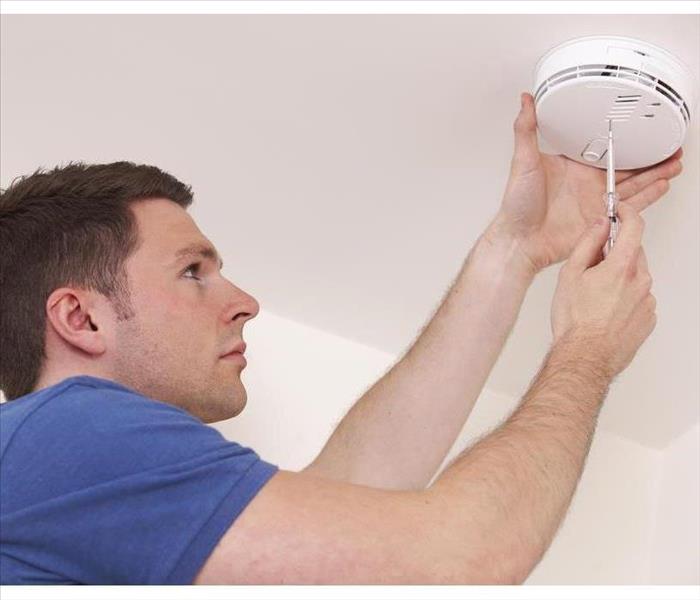Fire Prevention for Your Home
12/16/2022 (Permalink)
Fires can be devastating to you and your loved ones. Fires start every day and they can spread quickly. A fire that starts in a kitchen is the most common type of home fire, followed by fires started by smoking materials. When you are at home, always think about what kinds of things could cause a fire in your house and make sure you take precautions to prevent them from happening.
Multi-Purpose Fire Extinguisher
You should be sure to have a fire extinguisher in your home that is rated for all types of fires. The most common type of fire extinguisher is a multi-purpose one (rated A,B,C and K), but there are other options available as well.
The most important thing is to make sure you know how to use it! You don't want to cause more damage and make the situation worse by using an extinguisher incorrectly. Make sure everyone in the house knows how to use their own individual fire extinguishers as well so that everyone can help out if there's ever an emergency at home.
It's also important to have a plan for what you will do if a fire breaks out while no one else is around. This includes knowing when it's okay or not okay to call 911 (and who goes first) and having any evacuation plans ready in case someone needs rescuing from their rooms upstairs or outside windows/doors are blocked off by flames/smoke etc.
Smoke Alarms
You should have smoke alarms on every floor of your home. In fact, you should have one in every single room. The idea is that it's better to have too many than not enough: this way, you're protected in case something goes wrong with one (or two) of them.
We also suggest installing photoelectric smoke alarms because they're able to detect smoldering fires—like those caused by cigarettes or candles—whereas ionization units only alert people to flaming fires. This type of alarm will go off when there's just smoke in the air before there are flames visible; therefore, you'll be alerted quicker and be able to take action more efficiently!
Where do we recommend installing these alarms? It's best practice for any homeowner to place them 10 feet from any area where someone sleeps (i.e., bedrooms), but some states require them within 5 feet instead. They should go up high enough so that children can't reach them; additionally, if possible try placing them away from doors inside closets so they aren't accidentally disabled when people walk through their vicinity frequently throughout daily activities like changing clothes or getting ready for bedtime!
Practice, Practice, Practice
Have an escape plan in place for your family, and make sure to practice it twice a year. Make sure everyone in the house knows the plan. Test all of your smoke alarms and carbon monoxide detectors once a month and change the batteries when necessary (each time you change clocks for daylight savings time).
Remove Fire Hazards
The best way to prevent a fire in your home is to remove or relocate any items that could catch fire. If you have items such as clothing, blankets, and furniture on display, store them in a closet or other out-of-the-way place until they're needed.
Flammable liquids should be stored in tightly sealed containers, ideally away from heat sources. Smoking materials should never be left unattended. When cooking on the stovetop, keep an eye on the food without looking away for too long; if something catches fire or begins smoking excessively it's time to turn off your burner immediately!
Never leave heating appliances unattended while they're operating—if you walk away from it for even a few seconds it could cause serious damage to your home!
Never leave lighters or matches out where children can find them. Teach your child about fire safety and what to do if they see a fire. If you have children under six years old, make sure that all portable electric heaters are unplugged when not in use.
Don’t Overload Outlets
It's important to not overload electrical outlets or extension cords because doing so can lead to fires. If you're going to plug something in, do so only where the outlet is designed for the item being plugged in (for example, a lamp should only be plugged into an outlet that's specifically designed for lighting).
Lit Candles
Never put lit candles near curtains, upholstery or other flammable materials.
If you are having a party or gathering, make sure everyone knows to never leave a burning candle unattended and that it is okay if they do not want candles at their table.
Candles are great for adding ambiance but, like anything else in your home, can pose fire risks if not handled properly. If you have children in the house and keep candles around, make sure they know not to play with them—and always keep an eye on them when they're nearby!
Space Heaters
Space heaters are a great way to warm up your home on chilly days and nights. But remember, they can pose a fire risk if not used properly.
- Always keep space heaters at least three feet away from anything that can burn, including curtains and furniture.
- Never leave a space heater unattended when it’s on or even off!
- Never use a space heater if you’re drowsy or under the influence of drugs or alcohol (especially those containing alcohol).
The most important thing is to be able to recognize the signs of a fire in your home so that you can act quickly. Having a plan is also important, but having one and practicing it regularly will ensure everyone knows what to do when an emergency does occur. If your Punta Gorda home or business does catch on fire, give SERVPRO of Punta Gorda a call!



 24/7 Emergency Service
24/7 Emergency Service
